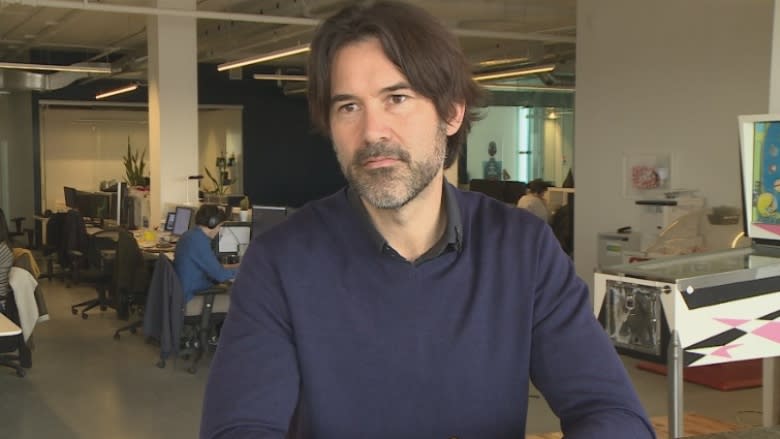Montreal's fledgling AI community foresees billion dollar industry on horizon
The light bulb flickers inside the old elevator that creaks as it takes you to the eighth floor of the 1960s-era building, tucked away in a corner of Mile End that was Montreal's garment industry a half century ago.
Walk down the dank corridor and into the office of Landr's. The contrast is striking: White, shiny and minimalist, the space embodies the new economy.
There's a pinball machine next to the kitchen, and pop art on the walls. Its 70 employees are young, educated and casually dressed.
The juxtaposition of the office space housing the four-year-old audio technology firm inside the aging building is an easy metaphor for how the Quebec government hopes to inject new life into its economy by kick-starting the artificial intelligence (AI) industry.
Quebec will invest $50 million in AI this year. In last week's provincial budget, Philippe Couillard's government announced it will add an additional $50 million by 2022.
It's part of a larger strategy, outlined in the budget, to encourage the creation of high-paying research and innovation jobs in the province.
Similarly, the federal budget tabled in March includes an allocation of $125 million to launch a pan-Canadian artificial intelligence strategy. Montreal, Toronto, Waterloo and Edmonton are all expected to receive a portion of that money.
Leveraging homegrown talent
As a Quebecer, Landr CEO Pascal Pilon never thought about leaving Montreal. His family is here, but he also believes this is where the fledgling AI industry will flourish.
Landr makes software that masters audio files.
Pilon's eyes glimmer with pride as he describes how artificial intelligence detects the genre of music that's being uploaded — instantly balancing the sound to make a more fulsome, rich recording.
Until now, if you wanted to master audio, you had to hire a sound engineer. That made it prohibitively expensive for most musicians. Landr's product can do the job for a fraction of the price.
Pilon says the AI community in Montreal has grown exponentially over the last few years.
"It's definitely flourishing. When we started the company back in 2013, it was something people were talking about every now and then, but now everybody's talking about it," he said.
The goal of scientists, business people and government alike is to leverage the AI talent that's here to create a worldwide hub of industry, competitive with places like New York and Silicon Valley, that the province could profit from for years to come.
Yoshua Bengio's AI lab
Montreal's burgeoning AI community emerged organically, largely thanks to the work of Université de Montréal's Yoshua Bengio.
Bengio runs the world-renowned laboratory, the Montreal Institute for Learning Algorithm.
He's considered a trailblazer in the field of AI called deep learning. Instead of having to be programmed, deep learning gives computers the ability to "learn" to solve complex problems.
It's used by companies such as Facebook and Google. Indeed, Google has pledged $4.5 million to support the lab's research and open an AI research group at its Montreal office. Microsoft has also invested
Bengio enthusiastically lobbied the government to notice Quebec's critical mass of AI researchers, who now number about 150 in Montreal. He's delighted with the funding announcement.
"[AI] might be the most important economic revolution coming to us," said Bengio.
Race to the top
But to be competitive, Bengio said Montreal needs to capitalize on its advantage now — before other jurisdictions catch up.
"Of course, it's a race. It's always a race when you're talking about innovation," said Dominique Anglade, Quebec's minister of economy, science and innovation.
To Pilon, the magic formula includes having available capital and local people to hire.
"The faster you can develop the actual product, [the faster] you can go to market and make it a success," Pilon concurs.
A smaller Montreal startup, Fuzzy AI, is hoping to grow from five employees to 25 over the next year.
Fuzzy AI creates AI agents that work like shopkeepers for businesses hoping to sell products online. Chatbots use the information you've given them to determine and present products a consumer might want.
The government's investment is a cause for celebration and optimism, says Fuzzy AI CEO Evan Prodromou.
"This kind of investment could be the seed that starts a billion-dollar industry," said Prodromou.
"It could be something that really kick-starts a process for Canada and puts us at the forefront of the world in AI. I think that's a really exciting thing for us."



